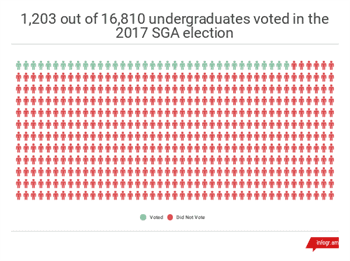Montclair State University students have spoken and they simply do not care about the Student Government Association’s (SGA) yearly election.
While SGA elections often have low voter turnout, this year, only 1,203 undergraduate students voted, amounting to about seven percent of the undergraduate population at Montclair State. This is a decrease from the 1,274 undergraduate students who voted in the SGA election last year.
With such a small number of individuals participating in the elections in the first place, a decline in 71 votes is a cause for concern. Clearly, students are becoming increasingly less involved in matters of the SGA. Yet, year after year, the SGA does not give students a reason to be engaged and involved in these decisions.
The SGA oversees and provides funding for nearly all student organizations on campus with the hopes of enriching student life at Montclair State University. However, the SGA cannot function efficiently if they do not fully understand the needs and desires of the undergraduate population. The first step to getting students involved in the dealings of the SGA is getting them to vote in the yearly elections.
The SGA election makes it easy to vote, by allowing undergraduates to vote online, and by leaving the poll open for several days to allow even the busiest student the opportunity to vote. Regardless of how easy and simple the voting process is, many students commonly cite not knowing about the election as the reason they did not vote or did not intend to vote.
The statutes of the Montclair State SGA state: “All legislators must work at least two hours publicizing the election in ways to be determined by the elections committee.”
With a maximum of 65 legislators in the SGA, if each completes two hour of promoting the elections, it would amount to 130 hours of promotion on behalf of the SGA. While this is a good attempt at reaching out to the student body, it is not the most effective as it is not yielding a higher voter turnout.
The SGA needs to reach out to students and students need to reciprocate. Students want to understand where their money is going. Students want to know who is representing them and they want to have a say in the funding of the student organizations they are part of.
In order to foster a mutually beneficial relationship, the student body and the SGA need to join forces. The SGA and undergraduate student population they represent need to meet in the middle to further understanding and create an open dialogue on issues that matter.
Hopefully, doing so will lead to a better voter turnout in future SGA elections.



